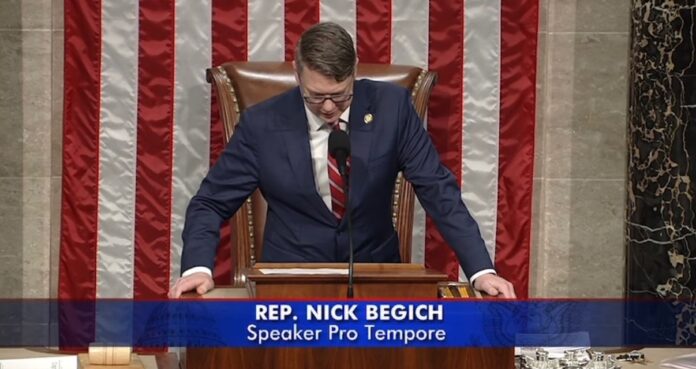In a nail-biter on Capitol Hill, House Republicans on Thursday morning passed a sweeping multi-trillion dollar budget reconciliation bill by the slimmest of margins — 215-214 — delivering a massive legislative win for President Donald Trump’s domestic policy agenda.
The outcome hinged on a single vote, and had Alaska’s Rep. Mary Peltola still been in office, the result would likely have gone the other way. Not a single Democrat voted for the Big Beautiful Bill, the budget.
Begich announced on X: “I just voted YES on H.R. 1: The Big Beautiful Bill. Last year, voters gave Republicans a clear mandate: cut reckless spending, secure the border, and grow our economy – and we delivered. This bill is a game-changer for working families and small businesses in Alaska and across America:
“$1.5 TRILLION in deficit reduction – the largest in nearly 30 years – while protecting the integrity of critical programs like Medicaid and SNAP
“Trump tax cuts made permanent – keeping life more affordable for hardworking Alaskans
“No tax on tips, overtime, or car loan interest”No tax on tips, overtime, or car loan interest
“$140+ BILLION for the strongest border security in U.S. history
“American energy unleashed – driving down costs and powering prosperity
“Medicaid & SNAP integrity restored – ensuring benefits go to those who truly need them
“$144 BILLION invested to strengthen our military and defend our nation I’ve always said: American prosperity starts in Alaska – and The Big Beautiful Bill puts America First and Alaska back on the map.”
The bill offers the largest tax cut in history — $13,300 more for American families and wage increases up to $11,000 for workers with a double-digit percent decrease to their tax bills, and no taxes on tips or overtime. Also, there’s a tax cut on Social Security benefits, an expanded child tax credit, and a tax deduction on American-made vehicles. Americans making between $30,000 and $80,000 per year will see their taxes cut by 15% next year.
The House pulled an all-nighter, with the final vote at about 2:30 am. Congressional members then drifted out of the Capitol and headed to their apartments for a few hours of sleep.
The bill, stitched together from 11 separate committee proposals, including several energy and resource items from Congressman Nick Begich of Alaska. It funds Trump-aligned priorities on taxes, energy, defense, and border enforcement, while enacting substantial cuts to social welfare programs. The cost of the bill over the next decade is projected to exceed $3.3 trillion, with a $4 trillion debt ceiling increase included to accommodate the spending.
The bill advances stronger border security, funding one million illegal immigrant deportations per year, thousands of miles of new border wall and barriers, 18,000+ new immigration officials.
The legislation, which now goes to the Senate, includes a permanent extension of key provisions from the 2017 Tax Cuts and Jobs Act, such as the $15,000 standard deduction, the 20% Qualified Business Income deduction for pass-through entities, and the $2,000 child tax credit, with the stipulation that both parents must possess Social Security numbers to claim it.
Temporary tax measures through 2028 include:
- Eliminating federal income taxes on tips and overtime pay
- Making the Adoption Tax Credit partially refundable
- Increasing the standard deduction for seniors by $4,000
- Eliminating interest on loans for American-manufactured vehicles
To partially offset the bill’s cost, Republicans targeted several Democrat-backed initiatives for repeal or reform. Medicaid and the Supplemental Nutrition Assistance Program (SNAP) faced major restructuring, with projected savings of $1.5 trillion. The legislation repeals or phases out numerous renewable energy subsidies from the Inflation Reduction Act and cancels President Biden’s student loan forgiveness plan.
Changes to SNAP include:
- Requiring states to pay 5% of SNAP benefits by FY 2028, with adjustments tied to payment error rates (Alaska has the highest in the nation in terms of error rates.)
- Ending eligibility for noncitizens other than legal permanent residents
- Restricting states’ ability to waive work requirements for able-bodied adults
Medicaid reforms restore pre-pandemic eligibility rules and impose work requirements on most able-bodied adults without dependents. The bill also cracks down on state-level financing maneuvers used to boost Medicaid reimbursements.
Democrats were unanimous in opposition.
Some Republican hardliners demanded deeper Medicaid cuts and faster repeal of green energy tax breaks. In the end, two Republicans — Reps. Thomas Massie of Kentucky and Warren Davidson of Ohio — voted against the bill, while Rep. Andy Harris of Maryland voted “present.”
Had one more vote flipped, the bill would have failed. The absence of Democrat Mary Peltola, Alaska’s former representative, was pivotal. With a single-vote margin, her continued presence in Congress could have killed the measure outright.
